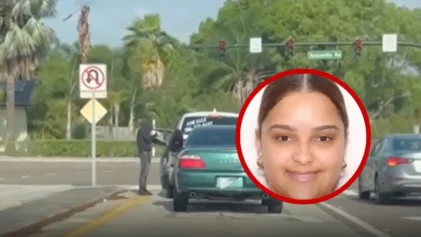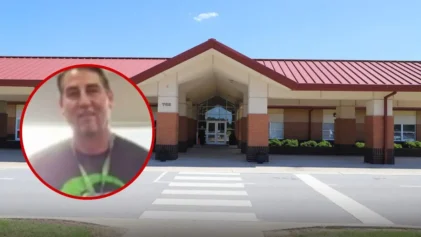Months after a 16-year-old Black girl was found dead on the side of a California highway, law enforcement, state officials and community stakeholders continue to look for her killers, even offering thousands of dollars to anyone with tips that can lead to a positive identification.
The reward money has increased 12 times over the original $10,000 pot, hoping to incentivize someone to come forward.

On Tuesday, April 19, the Los Angeles County Board of Supervisors said it would boost its contribution to the reward set to persuade anyone who could provide credible information leading to the arrest of the person responsible for Tioni Theus’ murder to $120,000.
Theus was found discarded on the side of the 110 Freeway in South Los Angeles on the Manchester Avenue on-ramp near South Figueroa Street on Jan. 8. Documents show the young woman was fatally shot in her neck before her murderers dumped her on the side of the road.
The original reward from the county was set for $10,000 but increased substantially after Gov. Gavin Newsom and Los Angeles City Council agreed to each donate $50,000. The board added an additional $10,000 to bump the amount up to $120,000.
Holly Mitchell, Los Angeles County Supervisor, made the motion to extend and increase the county’s reward offer.
She noted the teenager was a Compton resident who matriculated through Centennial High School, where she was a straight-A student who loved to dance and play golf.
Reports say after her mother was injured in a hit-and-run accident in 2019, she started to act out — disappearing for long periods of time. Around this time, while her mother was recovering, she went to live with her father.
“Investigators are urging anyone with information about this incident to contact the California Highway Patrol,” Mitchell said. “A reward will encourage members of the public to come forward with information that can help identify the individual(s) responsible for her death.”
It is believed those individuals may have exploited the girl, who was last seen on Jan. 7 for sex work.
The teenager told a loved one she was leaving to go to meet up with a friend and together they would go to a party.
In a news conference on Jan. 25, Los Angeles County District Attorney George Gascón revealed there is evidence suggesting Theus “may have been the victim of human trafficking,” NBC 4 reported.
She noted her name was listed in court records as a commercial sexual exploitation of children (CSEC) victim.
Tiffany Blacknell, Los Angeles County District Attorney Office special adviser, stated, “Children cannot consent to sex work. [Theus] was a child. Her life mattered.”
Her life mattered to her cousins. Two of her female cousins have publicly given context to her personality and the family’s grief.
Cousin Rashida Kincy said she was a “vibrant young lady that was just cut from so much that was ahead of her” and this tragedy has hit her family and the community hard.
“Yes, 16-year-olds have problems,” another cousin, Lakesia Barrett said “What 16-year-old didn’t? But the people who took her life got a chance to get it right. She don’t.”
Barrett continued, “She meant something to her mother who can’t be here. She meant something to her cousins who are here.”
According to research done by the U.S. State Department human trafficking over the last couple of years, in the age of COVID-19, has been particularly devastating as the global pandemic “generated conditions that increased the number of people who experienced vulnerabilities to human trafficking and interrupted existing and planned anti-trafficking interventions.” It also gave a definition of trafficking that sheds light on how commonplace the practice is in America.
The definition states trafficking is a “commercial sex act is induced by force, fraud, or coercion, or in which the person induced to perform such an act has not attained 18 years of age; or the recruitment, harboring, transportation, provision, or obtaining of a person for labor or services, through the use of force, fraud, or coercion for the purpose of subjection to involuntary servitude, peonage, debt bondage, or slavery.”
“A victim,” according to the office of Anthony Blinken, the U.S. secretary of state, “need not be physically transported from one location to another for the crime to fall within this definition.”
A separate study published by the Congressional Black Caucus and conducted by Rights 4 Girls, Institute for Women’s Policy Research, and Polaris breaks down how 57.5 percent of all juvenile prostitutes are Black children and 40 percent of suspected human trafficking incidents across the country (over the last two years) identify as Black females.
Further research shows since Black girls are more likely to experience poverty, sexual and physical abuse than their racial counterparts, making them prime targets for traffickers.
These factors coupled with the over-sexualization of and the systemic disconnect of discipline policies in schools for Black girls, the report asserts, are reasons why oftentimes people “criminalize” them, “rather than seeing them as victims.”
Aware of this tendency, activists have likened the reward pot for Theus to that of 24-year-old Brianna Kupfer. When the UCLA grad student was fatally stabbed on Jan. 13 inside a boutique furniture store in Hancock Park, the reward offered for her was $250,000 within six days of her slaying.
The CHP has asked anyone with information about the teenager’s shooting death to call the agency at 323-644-9557. Anonymous tips can also be submitted at 888-412-7463.


